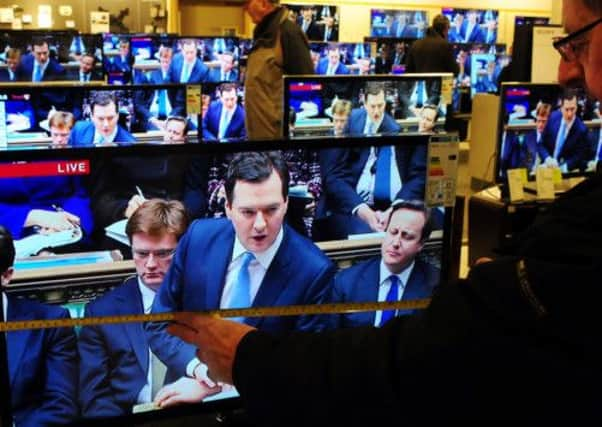Osborne bets the house


In a Budget speech delivered against a backdrop of severe economic gloom, as growth forecasts were slashed and officials warning that deficit reduction had “stalled”, the Chancellor proposed an ambitious ‘Help to Buy’ scheme to get the property markets moving and stalled housing projects underway.
The scheme will be open to anybody buying a new-build house worth up to £600,000, offering favourable terms to house-buyers but carrying a major risk to the public purse should the property market crash in the years to come.
Advertisement
Hide AdAdvertisement
Hide AdIt formed the centrepiece of a Budget package that also saw the creation of a new ‘employment allowance’ which will see the National Insurance bill of every firm in the country cut by up to £2,000.


Other eye-catching give-aways included the scrapping of the ‘beer duty escalator’ and a penny off the price of a pint of beer, along with the abandonment of September’s 3p rise in fuel duty.
A further one per cent was also cut from corporation tax, with Mr Osborne proclaiming “the lowest business tax of any major economy in the world”.
Labour leader Ed Miliband seized upon the dire economic outlook and attacked Mr Osborne as a “downgraded Chancellor” offering “more of the same – higher borrowing, lower growth”.
Advertisement
Hide AdAdvertisement
Hide AdBut the Chancellor insisted the Government’s “tough decisions” have cut the deficit by a third and helped create 1.25 million new jobs in the private sector since the last general election, while keeping interest rates at record lows.
As expected, Mr Osborne brought a planned increase in income tax thresholds to £10,000 forward to 2014, which Tory aides said meant that everyone who paid the 10p tax rate under Labour will next year be taken out of the tax altogether. Mr Osborne said his Budget was designed for an “aspiration nation”.
With figures released just hours before Mr Osborne’s statement showing unemployment up by 7,000, the limits to the room for manoeuvre available to the Chancellor were laid bare in a series of bleak forecasts published by the independent Office for Budget Responsibility (OBR).
The OBR halved its prediction for GDP growth for this year from 1.2 per cent to 0.6 per cent, and trimmed next year’s forecast from two per cent to 1.8 per cent.
Advertisement
Hide AdAdvertisement
Hide AdAnd the independent body said that the decline in Government borrowing seen in the first few years of the coalition “now appears to have stalled”.
Public sector net borrowing forecasts were revised upwards in every year to 2017/18, adding a total of £55.7bn to the amount the Chancellor is expecting to borrow over the next five years.
Debt will not fall as a share of national income until two years after Mr Osborne’s original 2015 target.
Mr Osborne acknowledged that recovery was “taking longer than anyone hoped”, but rejected Labour calls for a change in the course of economic policy.
“We must hold to the right track,” he told MPs.
Key measures at a glance
Advertisement
Hide AdAdvertisement
Hide AdNew ‘Help to Buy’ scheme to underwrite mortgages and provide loans for those who cannot afford a deposit.
£2,000-a-year National Insurance cut for every firm.
Beer duty escalator abolished and beer duty cut by 1p a pint.
September’s planned fuel duty rises dropped.
Corporation tax cut by 1p.
Personal income tax threshold raised to £10,000 from April 2014.
Funding for two carbon capture and storage schemes – including one in Yorkshire.
Extra £3bn-a-year to spend on infrastructure projects.
Tax breaks for childcare.
Green light for Lord Heseltine’s plan to devolve funding to the regions.
Tax breaks for Britain’s new shale gas industry.